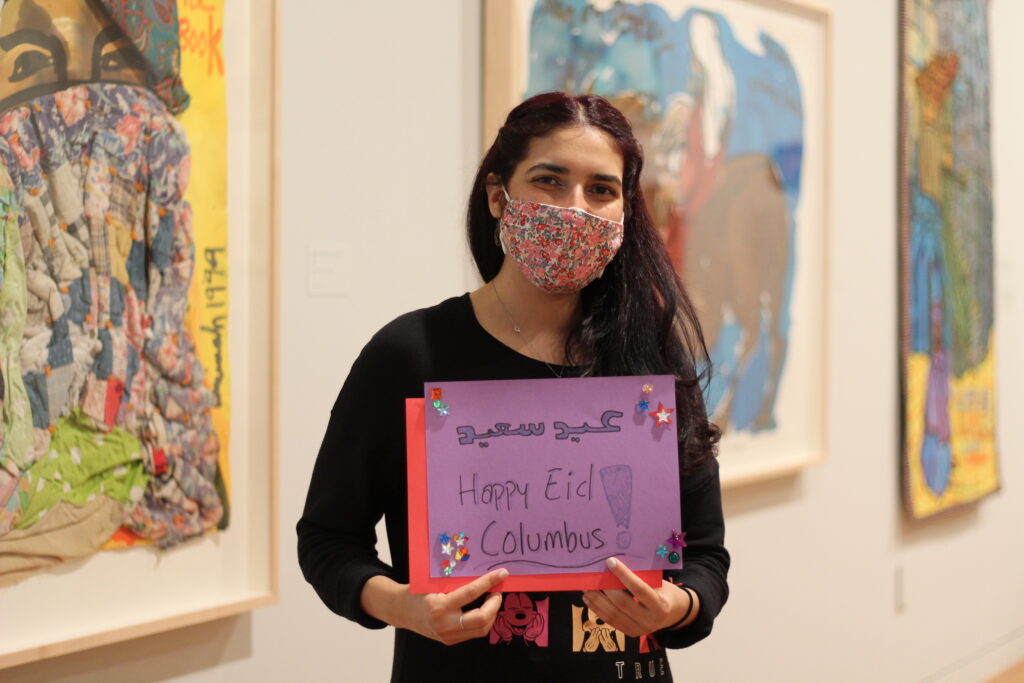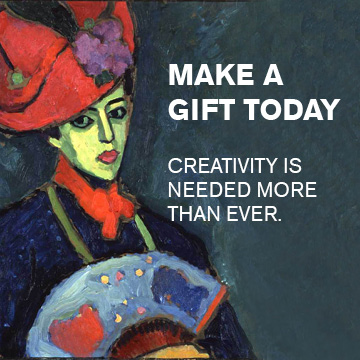
Shahd, with her favorite CMA artist, Aminah Robinson
First off, why don’t you tell us a little bit about yourself and how we know each other
Hello! My name is Shahd and I used to work at the CMA, in the Learning & Engagement Department. Part of our job is to help visitors to feel that they are always part of a welcoming community when they come to the Columbus Museum of Art, that they have all the assistance they need.
We wanted to talk today about Ramadan. There are so many books, articles, and other ways for people to learn more about Ramadan, but what would you personally want people to know about Ramadan or about Eid al-Fitr?
I would say that Ramadan is an amazing time within the Islamic community. The primary thing that people think about when they think about Ramadan is fasting. I want to say that fasting is not only a practice within the Islamic community. Most other religions and cultures, if you read about them, if you explore them, you will see that most communities participate in fasting. It can be very healthy for any person, healthy for your body, for anyone on the planet. In that way, the Islamic communities are not different from any other people, though we fast according to a calendar, with the moon, during the month of the Arabic calendar called Ramadan. That is why it’s called Ramadan, it is the same name as the month, as named in the Holy Book. People fast all day long, from sunrise to sunset, so that they can focus and feel their hungers and their needs. Hunger and need come to many people who don’t have enough food, who maybe don’t have good jobs, enough in life. However we may not think about them unless we go through those experiences ourselves. The experience of fasting is great for everyone to practice.
After sunset there is a feast, a lot of food. Lentil soup is a major food in most communities in breaking the fast, however different communities vary a lot because there is a lot of cultural diversity amongst Muslims. After 30 days, we celebrate Eid. This is when people go visit families, just like Christmas when everyone is expecting gifts from Santa (laughter), or at least from family. This is the same way with Eid, you exchange presents with family, it’s really a time for families to gather. That is the main point of the whole celebration.
Do you have any really strong memories or special memories of Eid from childhood?
Definitely! I grew up Iraq and I have wonderful memories of Eid from the age of 4 years old until I came to America. That’s when it became hard to feel Ramadan or Eid, basically because my family isn’t here. Still, it is a good time to celebrate with others in the Muslim community here in Columbus. I do have a few friends who are fasting, and we go visit them at Eid. Luckily, they have kids so it’s a great opportunity for me to give them books to read, because I love doing that. I love reading and I love giving people books, especially children’s books.
From the age of 5 to 25, every year we would visit my Granny’s house for Eid. I would get out my wallet and expect a lot of money (laughter). Sometimes I would spend it, sometimes my parents would feel like they had to save it away for me for later and would take it (laughter). So this is my main memory. I was one of those lucky kids with a big family, my father’s and mother’s families and my Grannies. We would go and visit them every single year. Even during the war when things were hard, the situation was changing, but still, this custom is one of our strongest so we definitely would go and celebrate it.
You mentioned that your family is far away. Perhaps a lot of people are going to be celebrating without their close family this year, not only because of the situation with the pandemic but because there are many people like you who have immigrated or migrated away from where their family is rooted. I wonder if there’s anything that you do that helps you to connect a sense of family, of place, of faith, to feel the Eid spirit?
Yes, and I would answer that question in two parts. Part one, about my family. I will definitely call them, social media and other technologies are wonderful at making it easier to be in contact even when you’re far. Now, because I come from the Middle East I understand that technology in different places can be a bit behind what many of us are used to in the US, so I know that not everyone will have a connection. However, there are always good people who will help you, especially on these special days. The power of holidays makes people even more willing to do things like lend their phones, help others to find a way to connect using technology, because connecting with family is so important, even if they don’t live in highly connected places. Like I said, with my family who are still in Iraq, the situation is getting harder and harder, but I would say to find ways to connect virtually with family and also to help other people to connect virtually with their family as you’re able.
The other part of my answer is that since I’ve lived in Columbus now for many years, I feel like I am part of the community here. So I always love to buy cards and send them. I love the American post office, and I am a huge supporter of it. I will buy some special Eid cards, there are now many companies that really care about celebrations in different communities, including the Muslim communities, so you can really find a wide range of cards now. This is one of the ways that I keep practicing every year, sending Ramadan and Eid cards to people I know in Columbus even if I don’t see them very often, it’s a time for me to remember them. And I will always get a text or something back, and that makes me feel connected to the community. So that’s my tradition right now.
Is there an Eid message that you would like to send out here?
I would send this wish not only the Muslim community, but the whole Columbus community. I’ve been in Columbus seven or eight years and I really feel safe here. I feel that most people I meet are friendly. I want to say that I really wish them all a very happy and healthy time. We are all in this together. 2020 was a very hard time for all of us. It doesn’t matter your background, your ethnicity, whatever religion you follow or whether you practice at all. We are all in the same boat together, and I hope that this year we can have more happy and healthy times together.
Bio: Shahd Rdawi is a Baghdad-born, Columbus based anthropologist, reading enthusiast, and, as of 2019, a citizen of the USA. This year, Shahd will launch an Instagram page, Once Upon a Narrative, dedicated to helping children, youth, and adults find literature that to discover the world’s cultures and unlock the power of stories.
